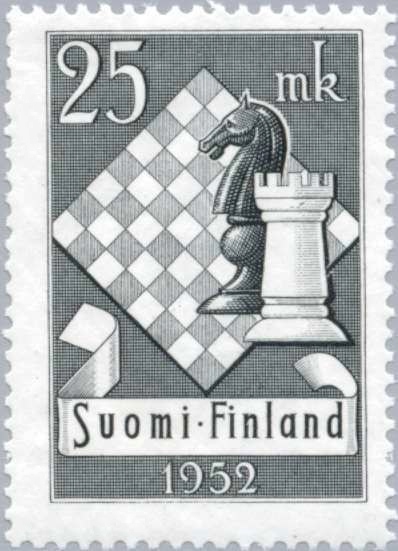1952 Chess Olympiad on:
[Wikipedia]
[Google]
[Amazon]
 The 10th
The 10th
10th Chess Olympiad: Helsinki 1952
OlimpBase {{Chess Olympiads 10 Olympiad 10 Chess Olympiad 10 Olympiad 10 Chess Olympiad 10 1950s in Helsinki August 1952 sports events in Europe
 The 10th
The 10th Chess Olympiad
The Chess Olympiad is a biennial chess tournament in which teams representing nations of the world compete. FIDE organises the tournament and selects the host nation. Amidst the COVID-19 pandemic, FIDE held an Online Chess Olympiad in 2020 and ...
( fi, 10. Shakkiolympialaiset; sv, Den 10:e Schackolympiad), organized by the FIDE
The International Chess Federation or World Chess Federation, commonly referred to by its French acronym FIDE ( F√©d√©ration Internationale des √Čchecs), is an international organization based in Switzerland that connects the various national c ...
and comprising an openAlthough commonly referred to as the ''men's division'', this section is open to both male and female players. team tournament, as well as several other events designed to promote the game of chess
Chess is a board game for two players, called White and Black, each controlling an army of chess pieces in their color, with the objective to checkmate the opponent's king. It is sometimes called international chess or Western chess to disti ...
, took place between August 9 and August 31, 1952, in Helsinki
Helsinki ( or ; ; sv, Helsingfors, ) is the Capital city, capital, primate city, primate, and List of cities and towns in Finland, most populous city of Finland. Located on the shore of the Gulf of Finland, it is the seat of the region of U ...
, Finland.
The Olympiad was especially notable for the debut of the Soviet team, who instantly won their first gold medals and went on to completely dominate the Olympiads for the next four decades.
After the tournament, it was generally agreed that the small preliminary and final groups of only 8‚Äď9 teams left too much open to chance, since a single blunder would have an impact too big on the final standings. Consequently, FIDE decided that in the future, no final should have less than 12 participants.
Results
Preliminaries
Twenty-five teams entered the competition and were divided into three preliminary groups of eight or nine teams. The top three from each group advanced to Final A, the teams placed fourth-sixth to Final B, and the rest to Final C. All groups and finals were played asround-robin tournament
A round-robin tournament (or all-go-away-tournament) is a competition
Competition is a rivalry where two or more parties strive for a common goal which cannot be shared: where one's gain is the other's loss (an example of which is a zero ...
s.
Group 1 was won by Argentina, ahead of West Germany and Czechoslovakia. England, Denmark, and Cuba took the following places, while Iceland, Saar, and Luxembourg finished in the bottom third.
Sweden took first place in group 2, ahead of Hungary and Yugoslavia. East Germany, Austria, and Italy took places four through six, while Brazil and Norway finished seventh and eighth.
Group 3 was won by the Soviet Union, well ahead of the United States and the Finnish hosts. Israel, the Netherlands, and Poland took the following places, while Switzerland and Greece finished at the bottom.
Group 1
Group 2
Group 3
Final
: : :Final A
Final B
Final C
Individual medals
* Board 1:Miguel Najdorf
Miguel Najdorf (born Mojsze Mendel Najdorf) (15 April 1910 – 4 July 1997) was a Polish‚ÄďArgentinian chess grandmaster. Originally from Poland, he was in Argentina when World War II began in 1939, and he stayed and settled there. He was a ...
12¬Ĺ / 16 = 78.1%
* Board 2: Vassily Smyslov
Vasily Vasilyevich Smyslov ( rus, –í–į—Ā–łŐĀ–Ľ–ł–Ļ –í–į—Ā–łŐĀ–Ľ—Ć–Ķ–≤–ł—á –°–ľ—č—Ā–Ľ–ĺŐĀ–≤, Vas√≠liy Vas√≠l'yevich Smysl√≥v; 24 March 1921 ‚Äď 27 March 2010) was a Soviet and Russian chess grandmaster, who was World Chess Champion from 1957 t ...
10¬Ĺ / 13 = 80.8%
* Board 3: David Bronstein
David Ionovich Bronstein (russian: –Ē–į–≤–łŐĀ–ī –ė–ĺŐĀ–Ĺ–ĺ–≤–ł—á –Ď—Ä–ĺ–Ĺ—ą—ā–ĶŐĀ–Ļ–Ĺ; February 19, 1924 ‚Äď December 5, 2006) was a Soviet and Ukrainian chess player. Awarded the title of International Grandmaster by FIDE in 1950, he narr ...
8 / 10 = 80.0%
* Board 4: ńĆenńõk Kottnauer 12¬Ĺ / 15 = 83.3%
* 1st reserve: Héctor Rossetto
H√©ctor Decio Rossetto (8 September 1922 in Bah√≠a Blanca, Argentina ‚Äď 23 January 2009 in Buenos Aires) was an Argentinian chess player.
He earned the title of International Master in 1950 and the Grandmaster title in 1960.
He was a five-ti ...
8 / 10 = 80.0%
* 2nd reserve: Ludwig Rellstab
Heinrich Friedrich Ludwig Rellstab (13 April 179927 November 1860) was a German poet and music critic. He was born and died in Berlin. He was the son of the music publisher and composer Johann Carl Friedrich Rellstab. An able pianist, he publi ...
6¬Ĺ / 9 = 72.2%
References
10th Chess Olympiad: Helsinki 1952
OlimpBase {{Chess Olympiads 10 Olympiad 10 Chess Olympiad 10 Olympiad 10 Chess Olympiad 10 1950s in Helsinki August 1952 sports events in Europe